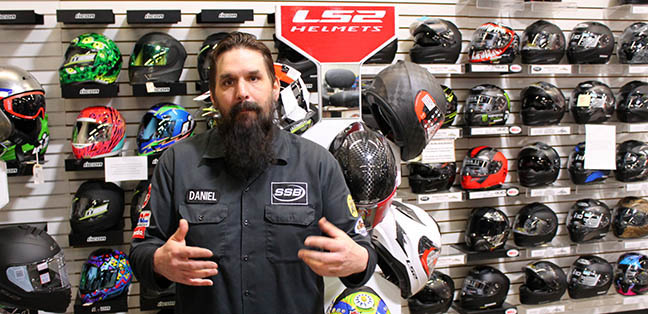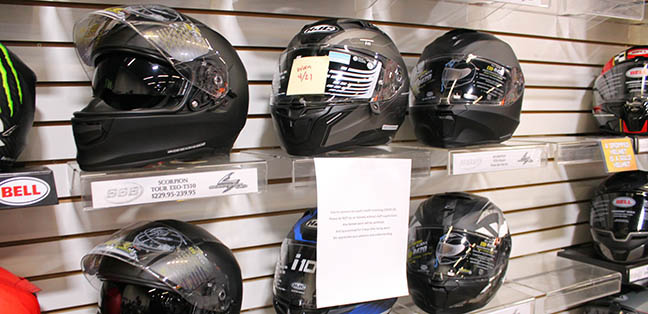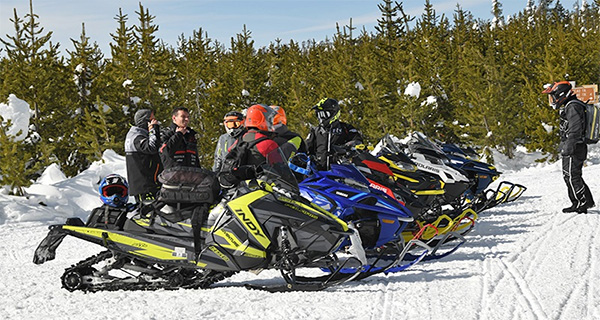Virtual helmet fittings part of new way for dealership
When we first heard of virtual helmet fittings at dealerships, we thought “What?” So Powersports Business staff reporter Nick Longworth did some investigative work. His report is below.
When it comes to picking the perfect helmet, it’s only natural that your dealership’s customers want to try before they buy. With something so pivotal for protection and customizable to style, customers want to make sure they’ve found the perfect match.
However, in the days following the onset of COVID-19, allowing customers to try on several different helmets essentially equates to tying up merchandise — at the end of the day they will only be buying one helmet, while the other helmets tested will need to be cleaned and quarantined.
Daniel Hedberg, parts manager of Simply Street Bikes in Eden Prairie, Minnesota, saw a clear stocking dilemma approaching, and decided to make an innovative pivot before all his helmets were all tied up just as the weather turned nice.
“The biggest thing is to minimize people and their time in the store. Traditionally, people walk into shops and try on 20 different helmets and find one they think ‘looks cool’ and ‘fits ok’ and buys it. Right now, if someone tries on a helmet, it has to be sanitized and quarantined for three days; I’ve got 300 little incubators hanging on the wall. I can’t roll into a Saturday with all the helmets quarantined and not have anything to sell.”

Since the onset a virtual fitting has been instituted prior to any physical in-store appointment to differentiate a customer’s head shape, variations in size from brand to brand, and make and model variations. The virtual fitting process offers a streamlined and informative way to make an educated decision, minimizing the time needed in-store, while still resulting in the same sales.
“We do a full education of the guest mostly via Zoom or FaceTime. We can find out what they actually need — whether it’s a race helmet, ADV rider, cruiser helmet or more. We show the guests how to measure their heads, narrowing down the selection even further. We can also have you send a photo of the top of your head to give us a better idea of shape… But even for people who are not very technologically ‘with it’ we can help them over the phone,” said Hedberg. “The purpose of all of this is to have two or three helmets in the correct size already selected before the guest comes into the shop for their appointment, versus having someone come in and try on 10 helmets, making them unsellable. We are basically doing 90 percent of our presentation online, so we can steer them to the right direction when they actually come in.”
Historically the average time for a helmet sale was about an hour. Meanwhile, oftentimes buying a helmet from an online-only retailer can be a crapshoot filled with negative reviews.
“Helmets are a ‘must try to know’ fitment. Since we have a focus on education and integrity, we don’t sell helmets without guests having tried them on, because even within brands there is extreme variation between them — we don’t just ‘sell a guy a lid.’ We get them properly fitted into a helmet that suits their needs and their head. But most of the qualifying questions can happen remotely. There’s a lot of information about helmets and they can actually be pretty complex — how they work, features, head shapes… The most common statement is ‘I wear an XL — I know what size I need.’ In reality, they need a medium. The majority of people don’t really know how helmets are supposed to fit. Now when they’re coming in we’ve got two or three helmets ready.”
In-between fittings Hedberg and his crew clean helmets by using an unscented disinfectant spray, then mandating a three-day quarantine of any stock that’s been tested.
“When we bring up our ‘helmet quarantine’ process people are like ‘I didn’t even think of that.’ Helmets are a super easy way to transfer COVID-19. But it’s April in the motorcycle business, we had to do something — this is when we sell 75 percent of our annual helmets and safety gear.”
Similar to most dealerships, Simply Street Bikes has a strict return policy for helmets, making customer satisfaction prior to purchase pivotal.

“We can’t control if the helmet gets dropped when it leaves here, making it unsafe for the person that ends up with it. We want to make sure the guest is getting the absolute best-fitting helmet when they leave,” said Hedberg.
The COVID-19 pandemic has the potential to change many aspects of retail operations permanently, such as the ability to procure sales remotely. Increasingly adaptive communication methods of reaching a customer base could become pivotal for success throughout the powersports industry.
“I absolutely believe this [virtual method] can be used elsewhere — in the parts department, sales department and more. I think that a lot of shops will end up doing some sort of hybrid,” Hedberg said. “There is a lot of cool tech stuff out there for communication. Use all of it. We’ve done Zoom hangouts and offered Moto Meetups — a group of customers in their respective garages showing off bikes or whatever project they are working on. There’s a ton of free programs like Slack and Trello to keep teams connected. I think a lot of the powersports business is behind when it comes to embracing that sort of technology. We’ve just tried to be resourceful and creative.”





